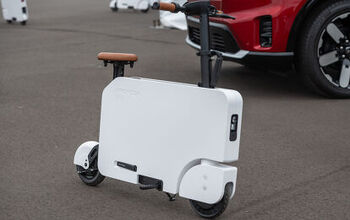Mercedes Spending $59 Million to Build ESprinter in U.S.

On Tuesday, Mercedes announced it would be pouring roughly $59 million (€50 million) to build the all-electric Sprinter van at three facilities. One of them will is the American MBV factory in Ladson, South Carolina, with the remaining two sites naturally situated in Düsseldorf and Ludwigsfelde, Germany.
Over 200,000 Sprinter and Metris model vans have been assembled in the United States since 2006, though the automaker had actually been using the state to avoid the chicken tax for much longer. Considering the region is the second-largest market for Sprinter vans, Mercedes is not interested in dissolving its American commitments either. The investment will be spread across the three facilities for the necessary tooling to build the EV variant the automaker already started selling in Europe.
Now equipped to do more than simply reassemble vans that came pre-constructed and then deconstructed) from Germany, South Carolina will reportedly be responsible for the complete assembly of 2nd generation eSprinter. The facility is supposed to be prepped for the job by the fall of 2023, with production following close behind.
[Images: Daimler AG]

A staunch consumer advocate tracking industry trends and regulation. Before joining TTAC, Matt spent a decade working for marketing and research firms based in NYC. Clients included several of the world’s largest automakers, global tire brands, and aftermarket part suppliers. Dissatisfied with the corporate world and resentful of having to wear suits everyday, he pivoted to writing about cars. Since then, that man has become an ardent supporter of the right-to-repair movement, been interviewed on the auto industry by national radio broadcasts, driven more rental cars than anyone ever should, participated in amateur rallying events, and received the requisite minimum training as sanctioned by the SCCA. Handy with a wrench, Matt grew up surrounded by Detroit auto workers and managed to get a pizza delivery job before he was legally eligible. He later found himself driving box trucks through Manhattan, guaranteeing future sympathy for actual truckers. He continues to conduct research pertaining to the automotive sector as an independent contractor and has since moved back to his native Michigan, closer to where the cars are born. A contrarian, Matt claims to prefer understeer — stating that front and all-wheel drive vehicles cater best to his driving style.
More by Matt Posky
Latest Car Reviews
Read moreLatest Product Reviews
Read moreRecent Comments
- 3SpeedAutomatic Elon took his eye off the ball while pre-occupied with "X" (formerly Twitter). Now, Tesla is coming around and biting him on the arse!!In the car business, you need to keep you finger on the pulse. Momentum will only carry you so far. If in doubt, think Lordstown and Fisker. He thinks technology will solve his problems. However, Telsa has moved from premier product to commodity with other manufacturers entering his exclusive domain. Time for Elon to fly back to Tesla HQ and come up with a long term plan. 🚗🚗🚗
- Irvingklaws Anymore seems I want a color that is not black, white, red, or some shade of silver/gray. Though I coveted them when I was younger, I also seem to have developed an aversion to all-black interiors. I have a deep negative reaction to any vehicle identifying as "triple black". Don't even get me started on black wheels...I'm not the only one. We're looking to replace my wife's silver CX-5 and one of her few non-negotiable prerequisites is that it be "a color" not in the aforementioned list. It's looking like a Cascade Green Forester with a light gray interior is in her future.
- Bd2 I dig it, Pure Pazaak!
- 3-On-The-Tree My C6 is all blacked out, the rims are matte black and interior all black with no contrast. I was never a fan of chrome rims and lots shiny chrome/silver trim etc.
- JMII Here are all the colors I've owned in order: tan, red, black, red, yellow, green, green, black, blue, silver, white, orange, red, blue and blue.So yeah I love colors...



































Comments
Join the conversation
I thought Dodge already did that.
59 million for one auto plant is nothing, let alone 3.